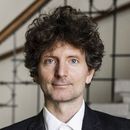Profile
Abstract
I am professor of neuroscience at the universities of Leipzig and Montreal.
I am interested in how the brain encodes and processes simple and complex sounds and how these mechanisms change when animals and people adjust to new listening situations. Examples are spatial hearing, brain responses to expected but absent sounds, age-related changes in plasticity, and machine learning analysis of brain imaging data. These studies address basic mechanisms of sound processing that underlie higher human auditory functions, such as speech and music perception. In the lab, we use high-resolution functional magnetic resonance imaging, EEG, brainstem recordings, optical imaging with genetically-encoded Ca2+ indicators, computational modelling, and a number of somewhat crazy devices, such a 48-channel spherical loudspeaker array and programmable earplugs that change the way people hear.
In addition to pure science, we address clinical questions about hearing disorders with these methods.
Professional career
- 05/2008 - 01/2016
Professor, Department of Psychology, University of Montreal - since 07/2016
Professor, Institute of Biology, Leipzig University - since 07/2016
Adjunct Professor, Department of Psychology, University of Montreal - 01/2010 - 01/2017
Adjunct Professor, Department of Neurology and Neurosurgery, Montreal Neurological Institute, McGill University, Canada
Education
- 01/2000 - 01/2004
Ph.D. student, Leipzig University & Max-Planck-Institute of Human Cognitive and Brain Sciences, Leipzig - 01/2004 - 01/2005
Postdoctoral fellow, Cognitive Brain Research Unit, University of Helsinki, Finland - 01/2005 - 06/2005
Visiting researcher, MRC Institute of Hearing Research, Nottingham, UK - 07/2005 - 04/2008
Postdoctoral fellow, Montreal Neurological Institute, McGill University, Canada
Panel Memberships
- since 10/2017
Representative, research profile area "brain dynamics", Leipzig University - since 01/2021
Speaker, graduate school "brain dynamics", Leipzig University - since 09/2019
Dean of the faculty of life sciences - since 01/2021
advisory board member, research data management initative Saxony (SaxFDM)
I am interested in how the brain encodes and processes simple and complex sounds, and how these mechanisms change when animals and people adjust to new listening situations. Research in my lab addresses basic mechanisms of sound processing that underlies higher auditory functions, such as speech and music perception. The lab uses high-resolution functional magnetic resonance imaging, EEG, brainstem recordings, optical imaging with genetically-encoded Ca2+ indicators, computational modelling, and a number of somewhat crazy devices and techniques, such as a self-build 48-channel spherical loudspeaker array and miniaturised programmable devices that change the way people hear.
In addition to pure science, I try to address clinical questions about hearing disorders with these methods. Additional lines of research and techniques include machine learning analysis of brain imaging data, age-related changes in plasticity and spatial hearing, and brain responses to expected but absent sounds.
- show detailsTrapeau, R.; Schönwiesner, M.The Encoding of Sound Source Elevation in the Human Auditory CortexJournal of Neuroscience. 2018. 38 (13). pp. 3252–3264.
- show detailsCha, K.; Zatorre, R. J.; Schönwiesner, M.Frequency Selectivity of Voxel‐by‐Voxel Functional Connectivity in Human Auditory CortexCerebral cortex (New York, N.Y.: 1991). 2016. 26 (1). pp. 211–224.
- show detailsSchönwiesner, M.; Krumbholz, K.; Rübsamen, R.; Fink, G. R.; von Cramon, D. Y.Hemispheric asymmetry for auditory processing in the human auditory brain stem, thalamus, and cortexCerebral cortex (New York, N.Y. : 1991). 2007. 17 (2). pp. 492–499.
- show detailsKreitewolf, J.; Mathias, S. R.; Trapeau, R.; Obleser, J.; Schönwiesner, M.Perceptual grouping in the cocktail party: Contributions of voice-feature continuityJournal of the Acoustical Society of America. 2018. 144 (4). pp. 2178–2188.DOI: 10.1121/1.5058684
- show detailsSchönwiesner, M.; Zatorre, R. J.Spectro-temporal modulation transfer function of single voxels in the human auditory cortex measured with high-resolution fMRIProc Natl Acad Sci U S A. 2009. 106 (34). pp. 14611–14616.
I teach the following regular courses:
Allgemeine Zoologie (BSc, 11-BIO-0101)
[This course is taught in German, thus the German description.]
Ein "101" Kurs zu allen Aspekten der Zoologie, der die Grundlage für den gesamten zoologischen Teil des Biologiestudiums bildet: Struktur und Funktion der Zelle, Vererbung, Ontogenese, Evolution, hormonale und neuronale Kontrolle, Sinnessysteme, Immunsystem, u.a.
Im Praktikum werden Baupläne von verschiedenen Tierstämmen (Einzeller bis Säuger) verstanden und verglichen, und Mikroskopiertechniken erlernt.
Neurobiologie (BSc) [German]
Der Kurs vermittelt die Grundlagen der Neurobiologie am Beispiel von Wirbeltiergehirnen, vom Neuron bis zu Funktion und Bau des Säugerhirns.
Das Praktikum lehrt ein praktisches Zurechtfinden im Säugerhirn, sowie klassische anatomische Methoden.
Neurobiologie 1 (MSc, 11-BIO-0705)
Advanced structure and function of neurons and brain systems: general architecture of the brain, development, advanced physiology of neurons, modifyability and learning, chemical senses, higher functions such as time perception and consciousness, computational modelling.
The practical course in an introduction to Python, and analysis and simulation of neuronal responses, including an introduction to deep neural networks.
Neurobiologie 2 (MSc)
A deep dive into the hearing system up to the current limit of knowledge. Heavily based on primary literature.






























































